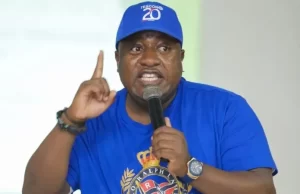The Ghana Police Service has petitioned the High Court to block a planned anti-illegal mining demonstration near the Jubilee House, the seat of government, citing security risks and procedural lapses.
The protest, organized by the Generational Rights Protection Society (GRPS), is scheduled to begin at Accra’s Obra Spot on April 28, 2025, and proceed to Liberation Square opposite the presidential complex.
In court documents filed on April 23, police argued organizers failed to secure permits for Liberation Square, a secured zone under Ghana Armed Forces jurisdiction. The affidavit, deposed by Greater Accra Regional Police representative General Sergeant Armstrong Ankomah, stated GRPS leaders Okatakyie Afrifa Mensah and Kwame Appiah Kubi did not respond to requests for details about participants or justify their insistence on holding the event from 4 p.m. to midnight. Authorities expressed concerns that the timing and location could attract “undesirable elements,” jeopardizing public safety and essential services.
“The right to demonstrate is not absolute and must respect public order,” the filing read, urging the court to restrict the protest to daylight hours (10 a.m. to 5 p.m.) and relocate it away from the presidential enclave. The police cited regional security tensions and intelligence suggesting possible infiltration by hostile actors.
The GRPS protest aims to pressure authorities to intensify efforts against illegal small-scale mining, known locally as galamsey, which has caused widespread environmental degradation. Past demonstrations on the issue have drawn significant public support, but this marks the first attempt to rally directly outside the Jubilee House, a symbolic gesture underscoring demands for executive accountability.
Ghana’s Public Order Act requires organizers to coordinate with police, though courts have historically upheld protest rights absent clear threats. Legal analysts note the case hinges on whether authorities can substantiate claims of imminent risk. Similar disputes have arisen in other African nations, where governments increasingly cite security to regulate assemblies near sensitive sites.
The standoff reflects deepening tensions between environmental activists and state institutions over resource governance. While the government has deployed military task forces to combat illegal mining since 2017, activists argue enforcement remains inconsistent. The GRPS protest seeks to amplify calls for transparency in mining revenue and ecological restoration, issues that resonate in communities affected by polluted waterways and deforested landscapes.
A ruling is expected before the protest date. If granted, the injunction could influence how future demonstrations near government buildings are managed. Conversely, a denial may embolden civil society groups to adopt high-profile locations for advocacy. Either outcome will be closely watched in a region where grassroots movements increasingly challenge state narratives on resource management and civic freedoms.
The case also raises questions about balancing constitutional rights with national security priorities, a dilemma facing democracies globally. As Ghana approaches national elections in 2024, the handling of such protests may signal the government’s tolerance for dissent amid rising public scrutiny of its environmental policies.
Send your news stories to newsghana101@gmail.com
Follow News Ghana on Google News

















